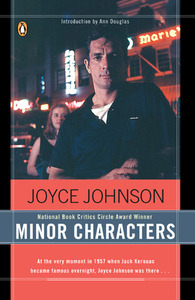Take a photo of a barcode or cover
challenging
dark
informative
medium-paced
Graphic: Suicide, Suicide attempt
Moderate: Racism, Violence, Murder, Sexual harassment
Minor: Antisemitism
What a wonderful book. It’s so refreshing to get a woman’s perspective on the heavily male-centered Beat Generation.
I started this book slowly, in fits and starts, before absolutely destroying it today. I was fascinated by the author's story, about living as an un-acknowledged member of the beat generation -- even more what that means living it on the edges, as a woman.
However, I was increasingly frustrated by the author's vagueness. To me, it read that she took it as a given that you'd be reading the book to hear about the beat men. Which, I was interested in reading about. But I was more interested in reading more about the author herself. She wrote herself as an observer and a mirror, a life leading up to Jack. A life lived with Jack. And then... nothing? Maybe that was the point of the book, but I was hoping for more.
Still - an excellent read. Recommended to any fans of the Beats.
However, I was increasingly frustrated by the author's vagueness. To me, it read that she took it as a given that you'd be reading the book to hear about the beat men. Which, I was interested in reading about. But I was more interested in reading more about the author herself. She wrote herself as an observer and a mirror, a life leading up to Jack. A life lived with Jack. And then... nothing? Maybe that was the point of the book, but I was hoping for more.
Still - an excellent read. Recommended to any fans of the Beats.
Published in '83, it is Joyce Johnson's memoir of her time w/ The Beats, and her affair w/ Kerouac. We don't get into that until half way through this short book. Much of her point is The Beats were pretty much an all-boys club. Yep, not sure anyone would argue that point w/ her. I've outgrown The Beats decades ago, but it was still interesting to read about them and NYC mid '50's. Intro by Ann Douglas (???)is mostly an attempt to say there were female Beat writers - but really, her examples were minor in comparison to the "major" (male) Beat writers. And many did not flourish until later. An enjoyable and informative read. Not sure I would pick up any of her other books. Maybe In the Night Cafe, which is a fictionalization of her youth.
Minor characters is a very telling memoir for those who are interested in the Beat generation, but I have a problem with it: it was the first Beat novel I'd ever seen written by a woman, and it's about how she followed Kerouac around and pined after him. She seemed to have many interesting friends, her own place, and a career that she was trying to start, which all would have made for an interesting memoir, yet she only mentioned them when she was talking about the things that she sadly filled her time with while Kerouac was off having his own adventures. It was great to have a new look at Kerouac, but I would have liked to see more about Johnson's own life and interests rather than just her sad love affair. In my opinion, the women of the Beat generation could have been much more than "minor characters" if they had only portrayed themselves as such.
It's been ages since I read this book but it was incredibly formative for me at the time, so I'm giving it all the stars for its impact on a developing mind. If you love the Beats, you'll enjoy getting to spend some time with them and then discovering who got left out of the conversation. If you don't love the Beats, you might enjoy watching them get taken down a peg or two. Or if you're indifferent to The Beats, this book is still worthwhile in its telling of women's stories, women who didn't get remembered or get their say the first time around.
If you are a Beat fan and haven't read this, I suggest you ought. Johnson's a very nice writer, but, more important, she applies necessary perspective to a movement that too often steamrollered the women who believed in it, supported it and its male writers (in MANY ways, specifically including financially and emotionally), but weren't supported, encouraged, or promoted themselves.
If you want to get a good picture of mid century NYC, and counterculture at the time, you won't do any better than this coming of age love story by & about Joyce Johnson, and her relationship with Jack Kerouac. Pair this with Sue Mingus' Tonight At Noon and you'll be doing well.
A good look into the behind-the-scenes of the beat generation.








